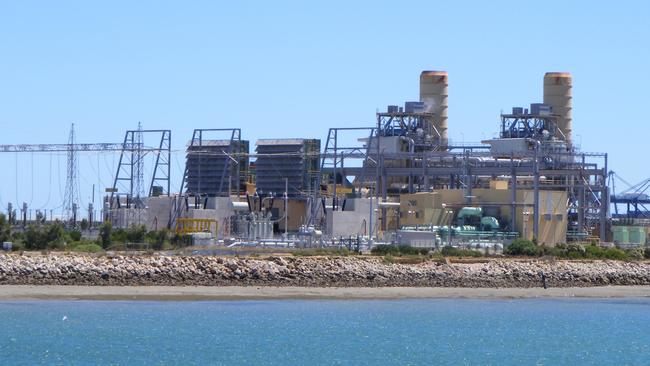Pelican Point owner cleared of market information failures
Owners of the gas-fired generator at Pelican Point have been cleared of the most serious allegations it contributed to blackouts affecting 90,000 customers.
The owners of the gas-fired generator at Pelican Point in Adelaide’s north have been cleared of the most serious allegations that failures to inform the energy market operator of changes to the plant’s capacity exacerbated rolling blackouts affecting 90,000 customers during a South Australian heatwave in 2017.
A four-year legal battle brought by the Australian Energy Regulator against French firm ENGIE, which operates the power plant, reached a key moment on Wednesday when Justice Anthony Besanko handed down his judgement in the Federal Court.
The AER had argued that for several months before the blackouts on February 8, 2017, Pelican Point failed to disclose that one of its generation units was capable of being made available on 24 hours’ notice.
While ruling ENGIE did not breach those obligations, it did find the company failed to update the Australian Energy Market Operator on changes to its short-term capacity forecasts when it had access to additional gas supplies days before the blackouts took place.

Under national electricity rules, generators are required to provide short-term forecasts of their available capacity across 30-minute intervals.
Justice Besanko ruled that ENGIE should have adjusted its forecasts and provided that information to AEMO on February 3, 2017, when it “ought to have a reasonable expectation of obtaining sufficient interruptible gas” to operate two 160MW gas turbines at the site.
“In my opinion, the central issue in this case on the evidence is the availability of gas transport,” he said.
“By early February 2017, it ought to have been clear to PPPL (Pelican Point Power Ltd) that it could reasonably expect to obtain sufficient gas transport to operate GT11 and GT12 (gas turbines) on 8 February 2017.
“It is difficult to fix the precise point in time at which PPPL ought to have had the reasonable expectation that gas and gas transport would be available such that PPPL’s ST PASA (short-term projected assessment of system adequacy) availability rose to 320MW and any doubt in a case involving civil penalty provisions should be resolved in favour of PPPL.”
The AER had argued that Pelican Point’s failure to inform AEMO about its additional capacity at the plant was partly behind the blackouts which could have otherwise been avoided.
Lawyers for Pelican Point had argued during the proceedings that the additional generator was not available because it did not have a firm contract in place to guarantee gas supply.
Despite AER’s contention that Pelican Point’s contraventions dated back months before the blackouts, Justice Besanko limited the period of contravention to just five days from February 3 to the date of the blackouts on February 8.
An ENGIE spokesman said the company would “review the details of the judgement along with our forward options”.
A spokesman for the AER said it would issue a statement on Thursday.
Pelican Point is operated by ENGIE, which owns 72 per cent of the power station. Japan’s Mitsui owns the remaining 28 per cent.
The matter has been adjourned for further deliberations on October 3.




To join the conversation, please log in. Don't have an account? Register
Join the conversation, you are commenting as Logout